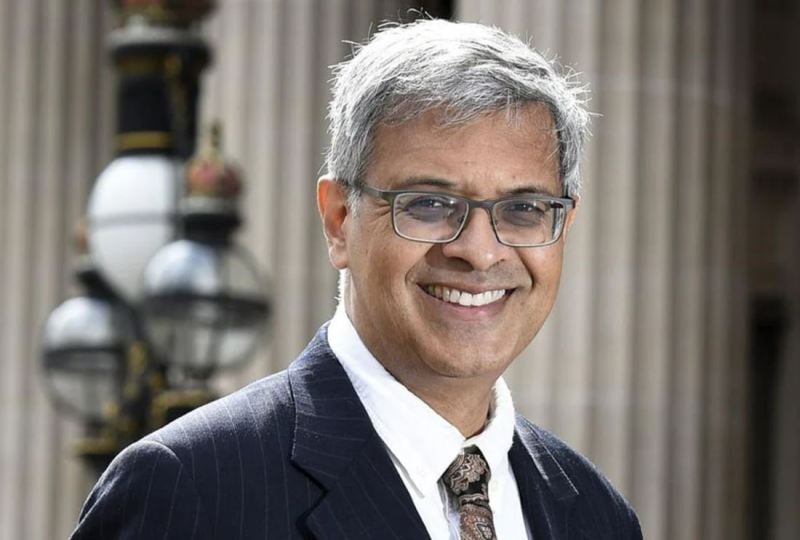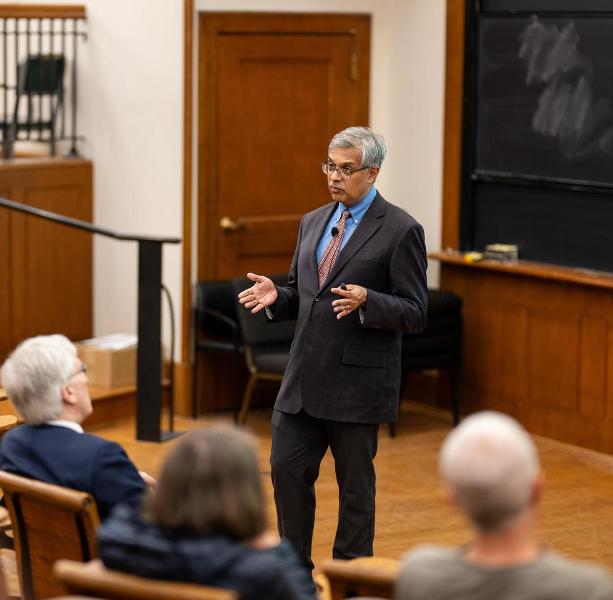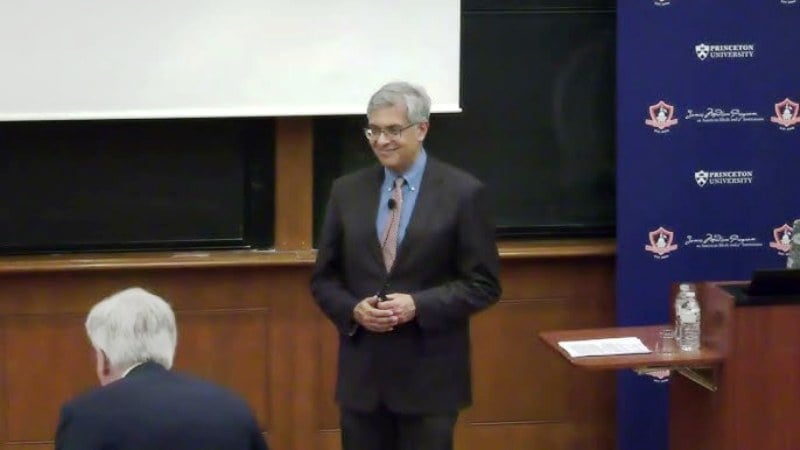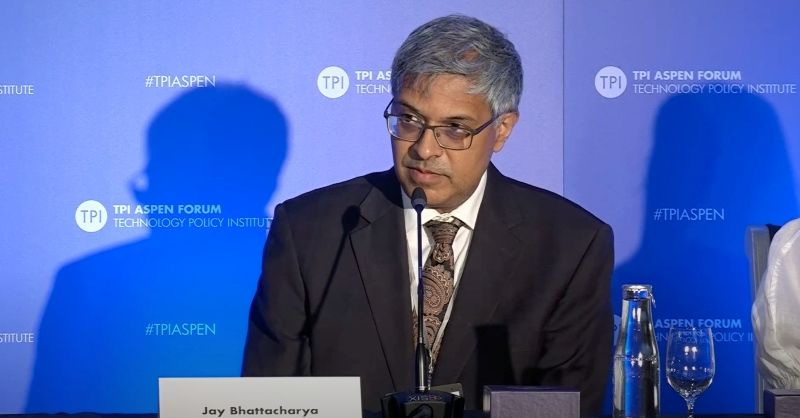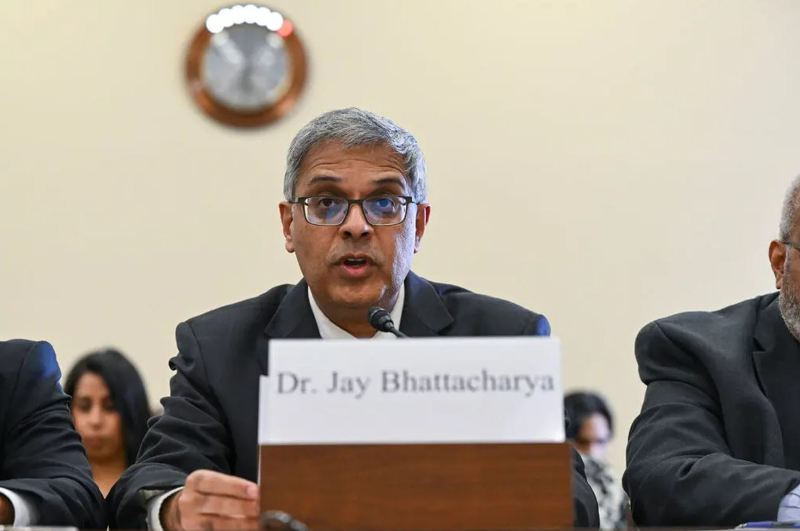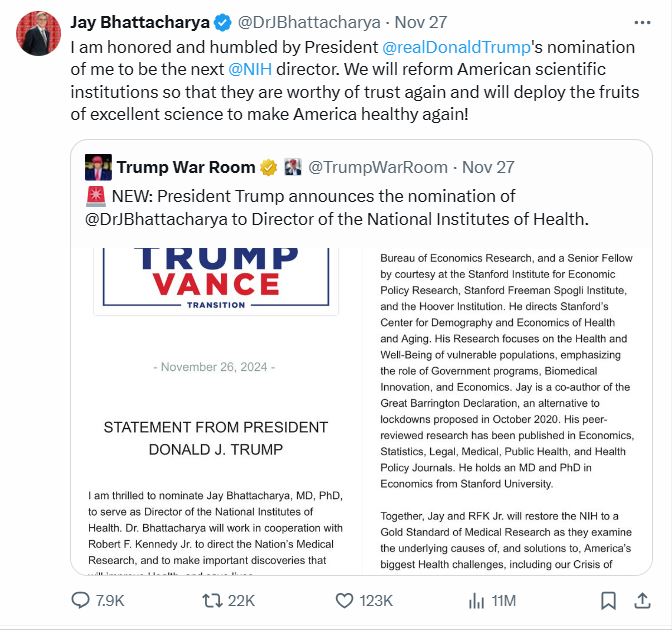Jay Bhattacharya Age, Wife, Children, Family, Biography
Quick Info→
Wife: Catherine Su
Education: PhD In Economics
Age: 56 Years
| Bio/Wiki | |
|---|---|
| Profession(s) | • Physician • Economist |
| Physical Stats | |
| Height (approx.) | 5' 10" (178 cm) |
| Eye Colour | Black |
| Hair Colour | Grey |
| Career | |
| Awards, Honours | 1988: Inducted into the Phi Beta Kappa Honor Society 1991-1992: Michael Forman Fellowship in Economics at Stanford University 1993-1995: Agency for Health Care Policy and Research Fellowship 1994: Outstanding Teaching Assistant Award in Economics at Stanford University 1997-1998: Olin Dissertation Fellowship by the Center for Economic and Policy Research 2005: Distinguished Award for Exceptional Contributions to Education in Medicine at Stanford University 2007: Distinguished Award for Exceptional Contributions to Education in Medicine at Stanford University 2013: Dennis J. Aigner Award for the best applied paper published in the Journal of Econometrics 2013: Distinguished Award for Exceptional Contributions to Education in Medicine at Stanford University 2022: Doshi Bridgebuilder Award by the Loyola Marymount University 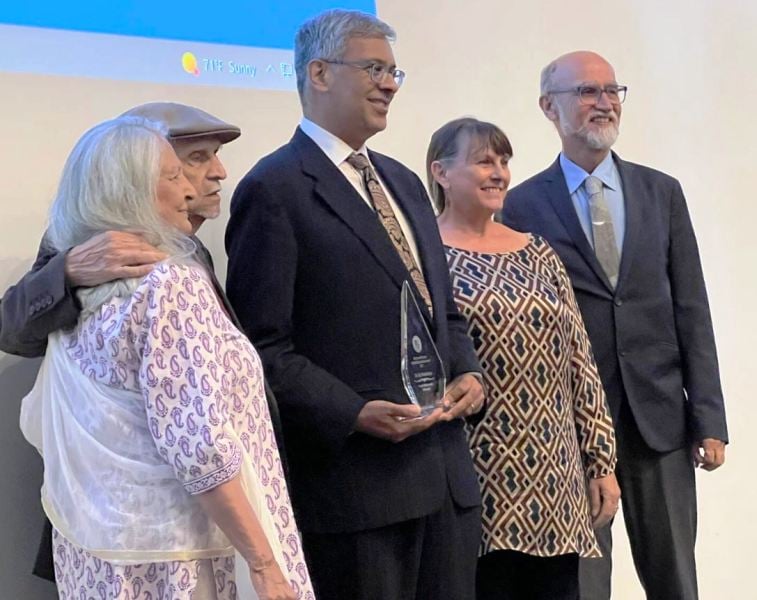 2024: Flame of Freedom Award by the Reason Foundation 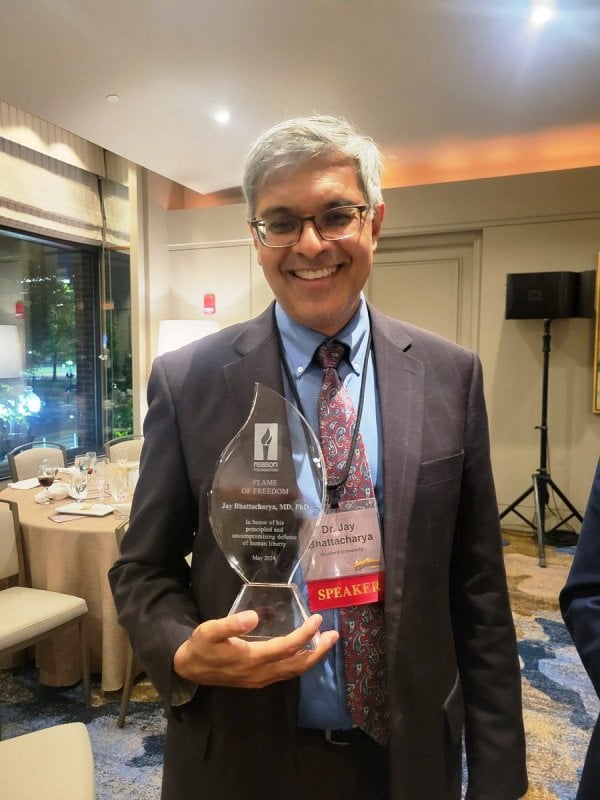 2024: Robert J. Zimmer Medal for Intellectual Freedom by the American Academy of Sciences & Letters 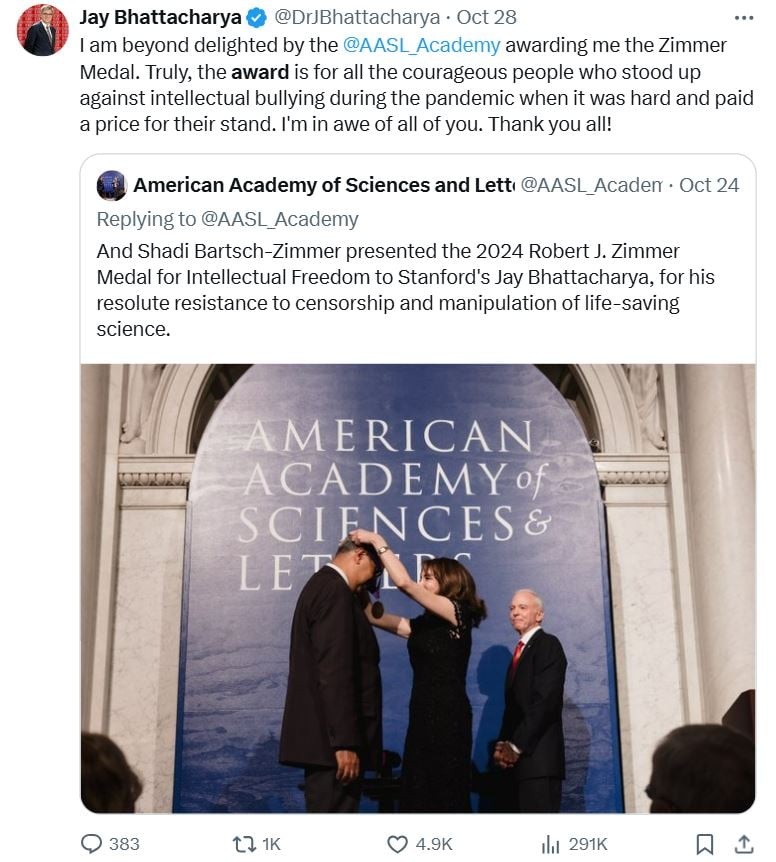 |
| Personal Life | |
| Date of Birth | Year, 1968 |
| Age (as of 2024) | 56 Years |
| Birthplace | Kolkata, West Bengal, India |
| Nationality | American |
| School | Claremont High School, California |
| College/University | • Stanford University, California (1990) • Stanford University School of Medicine (1997) • Stanford University - Department of Economics (2000) |
| Educational Qualification(s) | • Bachelor of Arts and Master of Arts in Economics (hons.) from Stanford University • Doctor of Medicine (MD) from Stanford University School of Medicine • Doctor of Philosophy (PhD) in Economics from Stanford University - Department of Economics |
| Ethnicity | Bengali |
| Controversies | Criticism and Censorship: During the COVID-19 pandemic in 2020, Jay Bhattacharya faced racism and death threats. Social media platforms like Facebook and Google labelled his views as "misinformation" because he questioned lockdowns and promoted alternative strategies like the Great Barrington Declaration. Jay later explained that he was misinterpreted the media wrongly accused him of wanting to "let the virus rip," an idea which he never proposed. [1]Reason Criticism of Testimony on Mask Mandates: In 2021, Jay was criticised during a Tennessee school mask mandate case. The judge described his testimony as "troubling and problematic" and pointed out that Jay had oversimplified a study's conclusions and lacked qualifications to speak on the pediatric effects of masks. [2]The Tennessean Twitter Blacklist: In 2021, Jay Bhattacharya's Twitter account was reportedly placed on a 'Trends Blacklist' to prevent his tweets from appearing in trending topics. This action was related to his first tweet supporting the Great Barrington Declaration. Despite this, he continued to share his views on other platforms.[3]Reason Backlash Over Involvement with Brownstone: Jay faced significant criticism due to his involvement with the Brownstone Institute in 2021. The institute published articles opposing various COVID-19 safety measures, including lockdowns and mask mandates. [4]MedPage Today Criticism of COVID-19 Misinformation: In 2022, Jay faced backlash for opposing a California bill aimed at punishing doctors for spreading false COVID-19 information. He argued it would stop doctors from helping their patients properly. Jay was also criticised for making false claims about COVID-19 boosters, including how they were tested. [5]SFGATE Legal Challenges: In 2024, Jay was involved in a US Supreme Court case called 'Murthy v. Missouri,' where he argued that his views were unfairly suppressed by the government. However, the court dismissed the case because Jay could not prove that the government's actions directly harmed him. [6]Reason |
| Social Media | • Instagram |
| Relationships & More | |
| Marital Status | Married |
| Family | |
| Wife/Spouse | Catherine Su |
| Children | Son(s)- 2 • Matthew Bhattacharya (younger) • Benjamin Bhattacharya (youngest) Daughter- 1 • Jodie Bhattacharya (eldest) |
| Parents | Mother- Madhuri Bhattacharya |
| Siblings | Brother- Deep Bhattacharya (managing director and founder of Boost Consulting) Sister- None |
Some Lesser Known Facts About Jay Bhattacharya
- Jay Bhattacharya was a member of the Research Advisory Panel on Japanese Health Policy Research at the Japan Foundation Center for Global Partnership (CGP) in New York.
- He served as a visiting assistant professor in the Department of Economics at the University of California, Los Angeles (UCLA) from 1998 to 2001.
- In 1998, Jay joined RAND Corporation, a non-profit global policy research institute, as an associate economist. He was later promoted to the designation of a full-time economist. He served in this position till 2001.
- In July 2000, Jay was invited to serve as a reviewer for the National Institute of Occupational Safety and Health R18 Demonstration Project Grants Review Panel in Washington, DC.
- Jay joined the Department of Health Research and Policy as an assistant professor in 2001. Later, he was promoted to the position of associate professor and then professor, a position he held until 2020.
- In 2001, Jay joined Stanford University as an assistant professor in the Department of Economics (by courtesy) and Department of Medicine. He was later promoted to the position of associate professor and then professor.
- In June 2001, he was invited to be a member of the Research Advisory Panel on Canadian Disability Measurement for the Canadian Human Resources Development Applied Research Branch in Ottawa, Canada.
- In 2002, he joined the National Bureau of Economic Research as an FRF to research associate.
- In August 2002, he was invited to review for the Food Assistance and Nutrition Research Program of the US Department of Agriculture’s Economic Research Service (ERS) Review Panel.
- He has been serving as a reviewer for various National Institutes of Health (NIH) panels since 2003.
- In June 2003, Jay was an invited reviewer for the NIH Social Science, Nursing, Epidemiology, and Methods (3) Review Panel in Bethesda, Maryland.
- In November 2003, Jay served as an invited reviewer for the NIH Social Sciences and Population Studies Review Panel in Bethesda, Maryland.
- In February 2004, he was invited to be a reviewer for the NIH Social Science and Population Studies Review Panel in Alexandria, Virginia.
- In June 2004, Jay served as an invited reviewer for two panels. One was the NIH Health Services Organization and Delivery Review Panel in Alexandria, Virginia. The other was the Food Assistance and Nutrition Research Program review panel organised by the US Department of Agriculture’s Economic Research Service in Stanford, California.
- Jay Bhattacharya was a standing member of the NIH Social Science and Population Studies Review Panel from the Fall of 2004 to the Fall of 2008. In December 2004, he served as an invited reviewer for the National Academy of Sciences (NAS) report on nutrition data and infrastructure.
- In November 2005, he was invited to review for a National Academy of Sciences (NAS) report on food insecurity and hunger.
- Jay worked as a research fellow at the Hoover Institution from 2006 to 2008.
- In 2007, he became a research associate at The SPHERE Institute and its partner firm Acumen, LLC.
- From 2007 to 2008, he was a member of an Institute of Medicine (IOM) panel that studied and made recommendations on regulating work hours for resident physicians to improve patient safety and physician well-being.
- In July 2009, he served on the NIH Stage 2 Challenge Grant Review Panel, which evaluated innovative research proposals addressing high-priority areas of public health.
- He served as a standing member of the Health Services Organization and Delivery (HSOD) review panel for the National Institutes of Health (NIH) from 2012 to 2016.
- Jay has been a senior fellow at the Stanford Institute for Economic Policy Research (SIEPR) since 2013 and at Stanford’s Freeman Spogli Institute for International Studies since 2014.
- In 2015, he served as an invited reviewer for the European Research Council’s Advanced Grant program, which funds experienced researchers pursuing groundbreaking projects.
- He chaired NIH review panels for the prestigious P01 Program Project Grant in 2018, which supports collaborative, multidisciplinary research, and the DP1 NIH Director’s Pioneer Award in 2020, which funds innovative, high-impact projects.
- Jay Bhattacharya was one of the first to question the strict lockdowns during the COVID-19 pandemic in 2020 as he was unsure how dangerous the virus was.
- On 24 March 2020, he co-wrote an article titled ‘Is the Coronavirus as Deadly as They Say?’ for The Wall Street Journal. In it, he argued, that there was not enough proof to support lockdowns and quarantines in the US.
- In April 2020, Jay helped lead a serology study in Santa Clara County, California. The study suggested that up to 80,000 people in the area might have already been infected with COVID-19.
- The serology study faced a lot of criticism for errors in the data and methods used. Critics also pointed out that the study did not clearly disclose possible conflicts of interest.
- In 2020, Jay co-wrote the Great Barrington Declaration, which suggested a different way to handle COVID-19. It recommended protecting vulnerable people from the virus while allowing healthy, younger individuals to return to their normal lives.
- In the Great Barrington Declaration, Jay and his colleagues, Martin Kulldorff from Harvard Medical School and Sunetra Gupta from Oxford University, argued that letting the virus spread among low-risk groups could help the population build immunity. They believed this would eventually reduce the spread of the virus and end the pandemic.
- In October 2020, the WHO’s Director-General criticised the idea of achieving herd immunity by letting the virus spread before a vaccine was available. Jay, who supported a different approach, hoped the Great Barrington Declaration would spark a debate on public health measures. He later met U.S. President Donald Trump’s health officials to discuss it.
- In early 2021, Jay opposed COVID-19 vaccinations in India and criticised lockdowns as a major mistake. As India struggled with the Delta wave, he argued the lockdown’s harm was worse than the virus.
- Bhattacharya later testified in court against COVID-19 restrictions in Canada, but the judge disagreed with his views. He then supported Florida’s ban on mask mandates and opposed vaccine passports.
- In December 2021, Jay co-founded the Academy for Science and Freedom at Hillsdale College in Michigan. The academy was established to promote free speech in scientific discussions, particularly regarding COVID-19.
- In 2021, Jay Bhattacharya was named a senior scholar at the Brownstone Institute, a think tank founded by American writer and publisher Jeffrey A. Tucker that opposed various COVID-19 safety measures.
- In December 2022, Florida Governor Ron DeSantis selected Jay, Professor of Medicine Martin Kulldorff, and others to join the Public Health Integrity Committee. This committee was created to review and critique guidance from federal health agencies.
- In 2024, Jay served as a senior courtesy fellow at Stanford University’s Hoover Institution.
- Jay Bhattacharya has often been a topic of debate due to his strong conservative support. Many critics argue that he spreads false public health information and avoids responsibility.
- He has written over 165 articles in leading peer-reviewed scientific journals across various fields, including medicine, economics, health policy, epidemiology, statistics, law, and public health.
- On 26 November 2024, Donald Trump nominated Jay Bhattacharya for the position of Director of the National Institutes of Health.
References/Sources:

